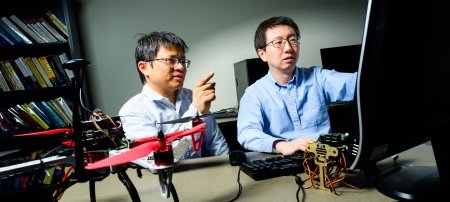As global temperatures rise, lightning strikes in the Arctic are becoming more frequent. A Michigan Tech detection station played a key role in gathering the data.
Since 2010, Michigan Technological University has hosted one of the antennae in a global network used to detect and triangulate lightning strikes. Located on top of the Dow building, the MTU station played an important role in locating lightning for a recently published paper about lightning strikes increasing in the Arctic due to climate change.
“Lightning — a giant electric current — generates radio frequency energy that travels thousands of kilometers away,” said Simon Carn, a professor in the Department of Geological and Mining Engineering and Sciences, which has been collecting data from the station to contribute to the World Wide Lightning Location Network.
“The burst of energy produced by lightning can travel 6,000 kilometers during the day and 12,000 kilometers at night — a long way around the world,” Carn said. “By measuring the arrival time of the pulse of energy at the stations, you can measure the energy and location of the strike.”
As the Earth’s climate changes, severe storms happen more often. As the American Geophysical Union points out, Arctic lightning strikes tripled over the past decade because of warming temps. The data gathered by the lightning location network is another measure of climate change and how it’s affecting our planet’s atmosphere.
Michigan Technological University is an R1 public research university founded in 1885 in Houghton, and is home to nearly 7,500 students from more than 60 countries around the world. Consistently ranked among the best universities in the country for return on investment, Michigan's flagship technological university offers more than 185 undergraduate and graduate degree programs in science and technology, engineering, computing, forestry, business, health professions, humanities, mathematics, social sciences, and the arts. The rural campus is situated just miles from Lake Superior in Michigan's Upper Peninsula, offering year-round opportunities for outdoor adventure.






Comments